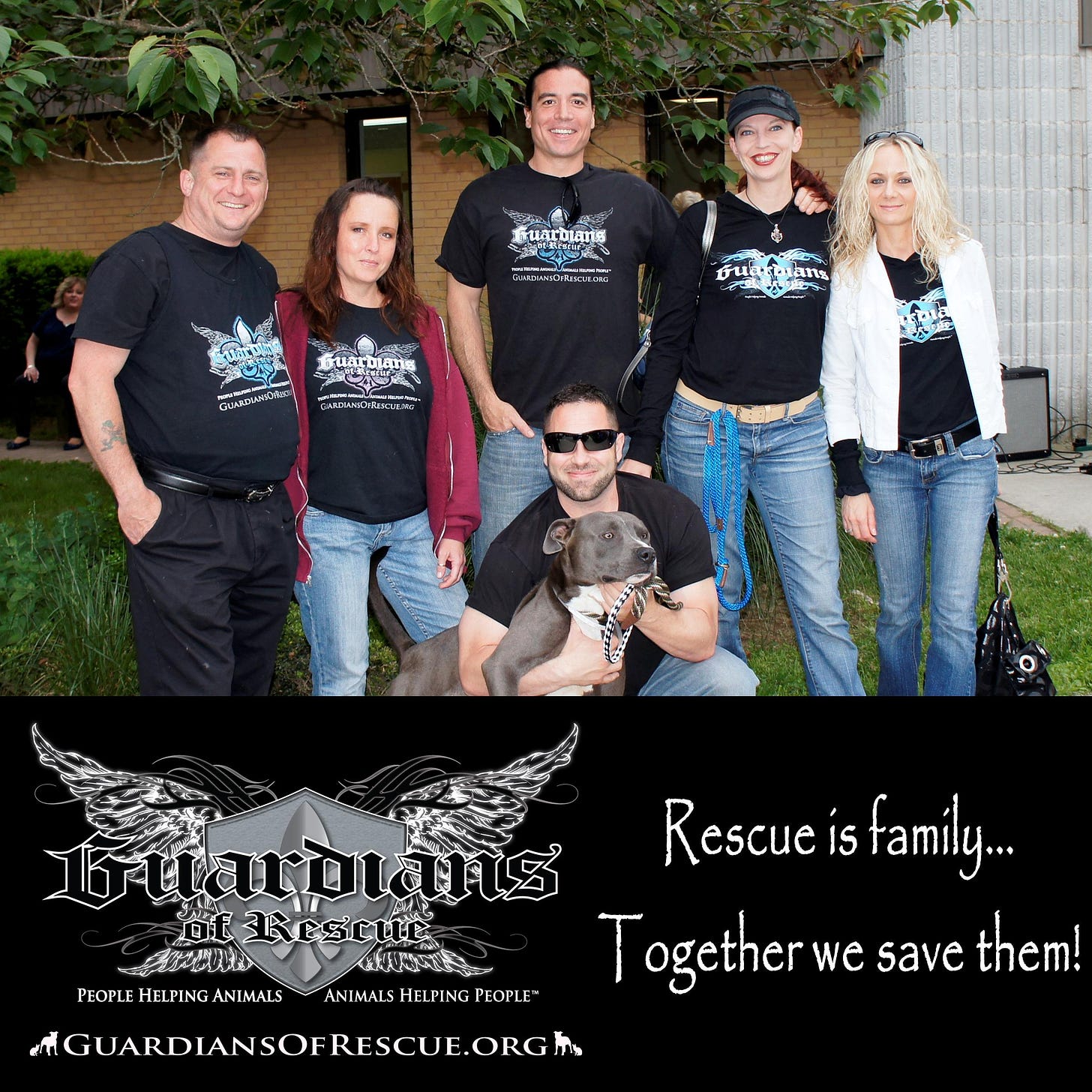Ken Wahl Inspired By Guardians of Rescue's Paws of War Project
By Jordan Schaul | National Geographic | October 18, 2013
The wisdom imparted by actor Ken Wahl who once played Vinnie Terranova on the hit CBS drama Wise Guy is always direct, profound, and timely. To veterans of war and animal lovers alike, his precious empathy and support are much appreciated.
Ken supports Guardians of Rescue’s Paws of War project for Veterans Day. The project is all about heroes saving heroes!
Interview:
Why is it important for you to promote Guardians of Rescue for Veteran’s Day?
Ken Wahl: I discovered when I injured my spine, that these animals were actually very therapeutic and helped me to cope with my chronic pain.
I’m determined to help decrease the astonishing rate of suicide among our military through what I’ve learned that helps me. This is one area that I know worked for me and helped me to cope with my injuries. I’ve always respected the military and I’m grateful they give us our freedom. So I feel this obligation to help disabled vets with rescued pets since the pets were always so helpful to me. And by them saving an innocent pet from being destroyed at a kill shelter, this also will make them feel better.
Why specifically Guardians of Rescue?
Ken Wahl: I’ve heard personal testimonials of how great this organization is in getting therapy dogs which the government doesn’t pay for. Each dog cost the government $20,000-$50,000, to train, so they dropped this service for veterans.
This organization finds the shelter dog that fits the veteran’s needs and then trains it, or they have a dog already trained for the veteran.
Do they pick a specific breed?
Ken Wahl: No, the dogs from the shelters are mutts and are much healthier and smarter than most purebreds if trained correctly. Guardians of Rescue will look for a specific breed from a rescue if the veteran should ask.
Do they only rescue dogs for the veterans?
Ken Wahl: They rescue dogs for active and non-active who suffer from PTSD or TBI. The disabled veteran may need a “comfort” animal as opposed to a therapy animal. For example, Guardians of Rescue will rescue a cat that a veteran with anxiety or insomnia has and the veterans benefit from “Purr Therapy,” which calms the veteran down and helps them to sleep. In some cases, they’ve used rabbits. (http://guardiansofrescue.org/videos/)
I was most moved by what the rescues, Guardians of Rescue did with stray dogs and cats in Iraq and Afghanistan that our military veterans became bonded with and needed when they returned home to help them cope with society. (http://www.usatoday.com/story/news/nation/2013/09/06/soldier-reunited-with-afghan-puppies/2778659/)
They also rescue dogs and cats left behind on military bases when servicemen or women are deployed. The bases normally send pets left behind on bases to kill pounds.
Were there specific types of animals or species that helped you with your spinal injury?
Ken Wahl: Yes, cats were most helpful for me as the pain kept me up all night and the “Purr Therapy” helped me sleep and cope with the pain. The purring also has been proven to help with vascular and bone problems. The rhythm of the purr has been proven by scientists to have some kind of healing power on the body as well as the mind. I have also had rescue dogs that have helped me cope with the chronic pain and help with things that may be hard to do.
I also promote Horses4Heroes, another organization that actually rescues horses from horse slaughter and uses them for equine therapy for veterans, or entertainment for the veterans’ families. I’ve heard nothing but great things about this organization. (http://horses4heroes.org/) Many veterans have also personally contacted me about how equine therapy has helped them to cope.
What message do you want to give for Veterans Day?
Ken Wahl: Veterans Day is a day to honor all of those who defended and fought for our country. I’d like to encourage people to donate to charities that help veterans since they can’t always depend on government help. Rescued animals have been proven, as cited in statistics, to always work, and I’ve had so many veterans tell me personally, the rescued animal has saved their life.
ABOUT NATIONAL GEOGRAPHIC SOCIETY
The National Geographic Society is a global nonprofit organization that uses the power of science, exploration, education and storytelling to illuminate and protect the wonder of our world. Since 1888, National Geographic has pushed the boundaries of exploration, investing in bold people and transformative ideas, providing more than 14,000 grants for work across all seven continents, reaching 3 million students each year through education offerings, and engaging audiences around the globe through signature experiences, stories and content. To learn more, visit www.nationalgeographic.org or follow us on Instagram, Twitter and Facebook.
MEET THE AUTHOR
Jordan Carlton SchaulWith training in wildlife ecology, conservation medicine, and comparative psychology, Dr. Schaul's contributions to Nat Geo Voices have covered a range of environmental and social topics. He draws particular attention to the plight of imperiled species highlighting issues at the juncture or nexus of sorta situ wildlife conservation and applied animal welfare. Sorta situ conservation practices are comprised of scientific management and stewardship of animal populations ex-situ (in captivity / 'in human care') and in situ (free-ranging / 'in nature'). He also has a background in behavior management and training of companion animals and captive wildlife, as well as conservation marketing and digital publicity. Jordan has shared interviews with colleagues and public figures, as well as editorial news content. In addition, he has posted narratives describing his own work, which include the following examples: • Restoration of wood bison to the Interior of Alaska while (While Animal Curator at Alaska Wildlife Conservation Center and courtesy professor at the University of Alaska) • Rehabilitation of orphaned sloth bears exploited for tourists in South Asia (While executive consultant 'in-residence' at the Agra Bear Rescue Center managed by Wildlife SOS) • Censusing small wild cat (e.g. ocelot and margay) populations in the montane cloud forests of Costa Rica for popular publications with 'The Cat Whisperer' Mieshelle Nagelschneider • Evaluating the impact of ecotourism on marine mammal population stability and welfare off the coast of Mexico's Sea of Cortez (With Boston University's marine science program) Jordan was a director on boards of non-profit wildlife conservation organizations serving nations in Africa, North and South America and Southeast Asia. He is also a consultant to a human-wildlife conflict mitigation organization in the Pacific Northwest. Following animal curatorships in Alaska and California, he served as a charter board member of a zoo advocacy and outreach organization and later as its executive director. Jordan was a member of the Communication and Education Commission of the International Union for the Conservation of Nature (CEC-IUCN) and the Bear Specialist Group of the IUCN Species Survival Commission (BSG-SSC-IUCN). He has served on the advisory council of the National Wildlife Humane Society and in service to the Bear Taxon Advisory Group of the Association of Zoos and Aquariums (AZA Bear TAG). In addition he was an ex officio member of the council of the International Association for Bear Research and Management. Contact Email: jordan@jordanschaul.com http://www.facebook.com/jordan.schaul https://www.linkedin.com/in/jordanschaul/ www.jordanschaul.com www.bicoastalreputationmanagement.com




